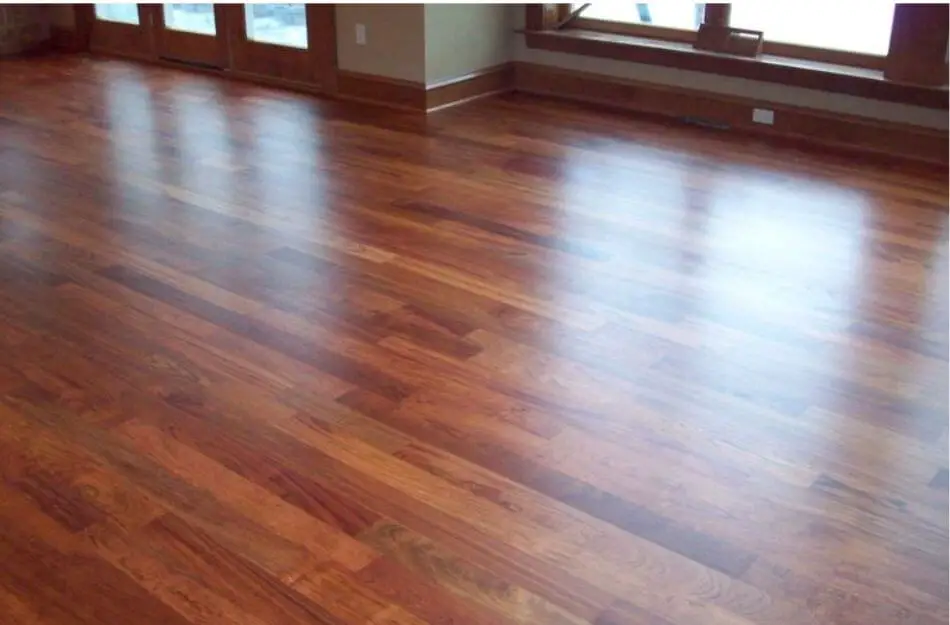The smell of freshly mopped hardwood floors is a classic sign of a clean home. But what if you could achieve that same shine and cleanliness with a natural ingredient you likely already have in your pantry? Apple cider vinegar has become a popular natural cleaning solution in recent years, and many people are wondering if it’s safe to use on their beloved hardwood floors. The short answer is: it depends. While apple cider vinegar can be a useful tool for cleaning various surfaces, its effect on hardwood floors can be a double-edged sword.

Image: www.msn.com
I recently moved into a charming old house with beautiful hardwood floors. I was determined to keep them looking their best, so I started using apple cider vinegar in my cleaning routine. After a few weeks, I noticed that the floors were losing their shine and appeared slightly dull. I felt a bit defeated until I did some research and discovered that apple cider vinegar could actually be damaging my floors. This experience taught me a valuable lesson about the importance of understanding the nuances of natural cleaning solutions and how they interact with different surfaces.
The Science Behind Apple Cider Vinegar and Hardwood Floors
Apple cider vinegar (ACV) is renowned for its versatility. It’s an acidic solution that can effectively break down grime, grease, and even bacteria. Its acidity is the key to its cleaning power. However, this same acidity can be detrimental to hardwood floors.
Hardwood floors are generally coated with a protective layer of sealant. This sealant acts as a barrier, protecting the wood from scratches, stains, and moisture. The acidity in ACV can erode this sealant over time, making the floor more susceptible to damage. This erosion could lead to a dull finish, water damage, and even discoloration. Additionally, the wood itself can react negatively to the acetic acid in ACV, potentially causing it to become brittle or discolored.
Understanding the Impact of ACV on Hardwood Floors:
The impact of ACV on hardwood floors depends on several factors, including the type of wood, the finish, the age of the floor, and the frequency of application. Some types of wood are more porous than others, making them more susceptible to damage from ACV. Additionally, sealed floors are more resilient, but if the sealant is worn down or damaged, ACV can penetrate the wood and cause problems.
While ACV can be a potent cleaning agent for various surfaces, its use on hardwood floors is generally discouraged. The risk of damaging the finish and the underlying wood outweighs any potential benefits. It’s important to prioritize the longevity and beauty of your hardwood floors by opting for cleaning solutions specifically formulated for their delicate nature.
Alternatives to ACV:
If you’re seeking a natural and effective way to clean your hardwood floors, there are safer and more suitable alternatives available. Many specialized hardwood floor cleaners use natural ingredients like tea tree oil or citrus extracts, which are less likely to compromise the finish. You can also use a simple solution of warm water and mild soap to clean your floors. Remember to always follow the manufacturer’s instructions for your specific floor type.

Image: flooringflow.com
Expert Tips for Maintaining Hardwood Floors:
To ensure the longevity and beauty of your hardwood floors, consider these expert tips:
- **Regular Cleaning:** Sweep or vacuum your floors regularly to remove dust and debris that can scratch the surface.
- **Damp Mopping:** Use a damp mop with a recommended hardwood floor cleaner. Avoid saturating the floors, which could lead to warping.
- **Spot Cleaning:** For spills or stains, address them promptly with a soft cloth and a mild cleaning solution.
- **Protection:** Place mats or rugs at entrances to prevent grit from being tracked in.
- **Polishing:** Consider professional floor polishing to restore the shine and protect the finish.
By following these tips and using the appropriate cleaning solutions, you can keep your hardwood floors looking their best for years to come. Avoid using harsh chemicals, acidic cleaners like vinegar, and abrasive materials that can damage the finish and the underlying wood.
FAQs about Hardwood Floor Care:
Q: How often should I clean my hardwood floors?
A: You should sweep or vacuum your floors daily to remove dust and debris. Damp mopping once or twice a month is usually sufficient for most households. You may need to mop more frequently if you have pets or high foot traffic.
Q: Can I use a steam cleaner on hardwood floors?
A: Use caution with steam cleaners on hardwood floors. Excessive heat and steam can damage the finish. Check the manufacturer’s instructions for your specific flooring and steam cleaner.
Q: What are the best cleaning products for hardwood floors?
A: Opt for cleaning solutions designed specifically for hardwood floors. Look for natural ingredients like tea tree oil or citrus extracts. You can also use a mild soap solution, but avoid using harsh chemicals or acidic cleaners like vinegar.
Q: What are some signs that my hardwood floors need refinishing?
A: Signs your hardwood floors may need refinishing include noticeable scratches, dullness, or discoloration. You can also check for any areas where the finish is wearing off.
Q: How do I maintain the shine of my hardwood floors?
A: Regular polishing can help restore the shine of your hardwood floors. You can use a specialized polishing product or hire a professional for a deep cleaning and polishing.
Can You Use Apple Cider Vinegar On Hardwood Floors
Conclusion:
While apple cider vinegar’s cleaning prowess is undeniable, its application on hardwood floors should be avoided. Consider using specialized cleaners designed for hardwood floors to protect your investment and preserve the beauty of your floor. Maintaining your floors with recommended practices like regular cleaning, damp mopping, and protection will keep your hardwood floors looking their best.
Are you interested in more tips on how to care for your hardwood floors? Share your questions or experiences in the comments below!






